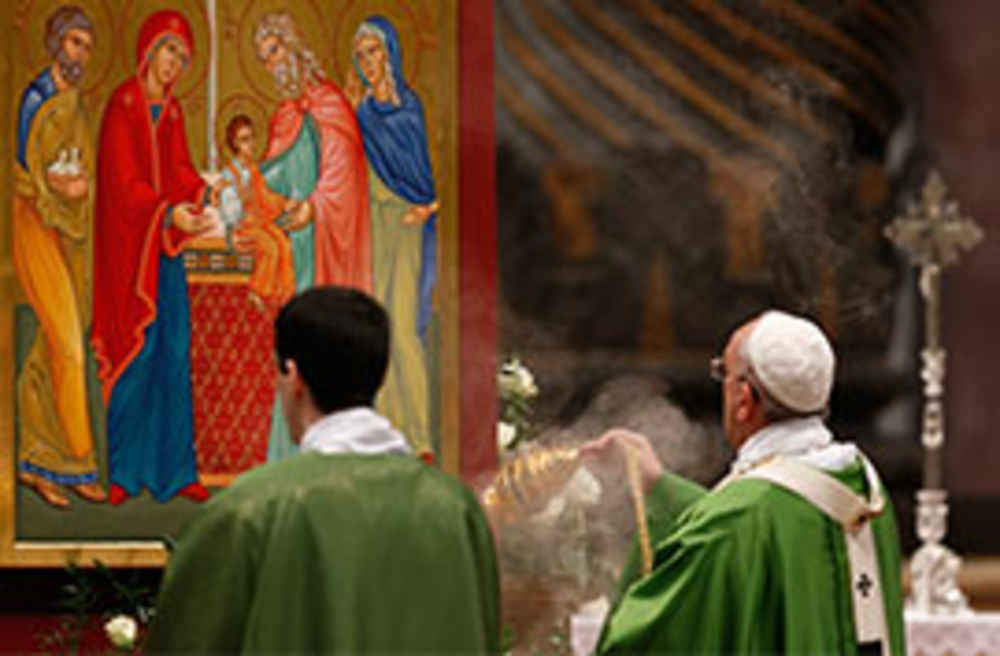Reflections from the Synod

Dear Friends,
Greetings and prayerful best wishes from Rome.
Since so much is being written and said about the progress of the Synod of Bishops on the Pastoral Challenges of the Family in the Context of the New Evangelization, I thought it would be helpful to share a few thoughts from the perspective of someone inside the Synod.
In so many of the short talks given by Synod participants, the beautiful and scripturally-rooted vision of the Catholic understanding of marriage was lifted up as the starting point of our discussion. It was universally recognized how important the bond of marriage is and that it is indissoluble. At the same time, our understanding of marriage was seen as a source of encouragement for people trying fully to live that sacramental state of life.
A second major point included many reflections on the situation in which marriage is lived today in the midst of the human condition. What so many people are hearing from our culture today does not correspond to the Church’s teaching on marriage. Consequently, the challenges are many. There are large numbers of failed, broken and nonfunctioning marriages and numerous statistics were cited to show how many people live in second marriages or do not bother to get married at all. All of this highlights the increasing distance between our Gospel vision of marriage as it is seen in our teaching and the actual lived reality in concrete practice.
We also heard a great deal about the influence of the dominant secular culture. It was noted that there is little or no societal support for the Gospel view of marriage. In fact, the opposite is more likely the reality. Social structures and institutions that once supported the Judeo-Christian tradition dominant in Europe and found reflected in various parts of the world, no longer provide the societal context for young adults today.
In consequence of this state of affairs, there is serious reason to doubt whether the Church’s understanding of marriage is what many, many people today understand by marriage. In many places, there is no societal expectation of marriage as an enduring lifelong commitment to a family.
How are we to respond in this type of environment?
Many Synodal Fathers highlighted the need for the Church to be clear, convincing and effective in her timeless teaching. This is a continuous task that the Church has always faced but, as recognized in the New Evangelization, we need to find better ways of passing on our understanding of the faith and evoking a commitment from our young people.
Once the discussion turned to how effective has our teaching been and how many people really understand the nature of the sacrament of marriage and its indissolubility, the conversation focused on healing those who have been wounded by these cultural currents.
It was pointed out that, in addition to teaching, the Church has to approach marriages today, particularly for those people who were married, divorced and/or remarried, with a sense of healing and find a way to bring people to experience the love and mercy of God.
Here it was pointed out that mercy is not opposed to truth but follows on it. In fact mercy flows from the truth. It is the truth that brings freedom.
When the question of responding to the current situation moved from the teaching to the healing dimension, it was necessary to determine what exactly happened in the case of individual couples. This brought the discussion into the area of annulments and the need to streamline that process and even provide a more direct, clear and easily accessible structure to reach a determination as to the validity of their marriage.
It was generally agreed that the context of our discussion today is radically different than even a quarter of a century ago. Now we also face issues of “same-sex marriage” and gender identity as a matter of choice. Thus, we need to find a better way of expressing our Catholic faith in a language that is accessible to the many people who have drifted away from the faith, helping them to better appreciate the Good News that is Jesus’ revealed truth on marriage and the nature of the human person.
Finally, there was the growing recognition that we need to be able to reach out in an inviting manner to those who find themselves in situations that call for the presence of Gospel healing and accompany such people with love on the journey that is intended to bring all of us closer to Christ. For example, while the Church’s teaching on human sexuality is not up for debate, it is important that we examine the language we use and our pastoral approach toward individuals with same-sex attraction.
Much has been discussed at this Synod and the discussion will go on after it concludes. This assembly is part of a much larger process, which will continue with a Synod next year and beyond. Pastoral solutions to intractable problems are not going to come easy. Yet, we are going to try to do what Jesus has asked us to do, listening to one another, talking to one another and remaining open to the Holy Spirit.
Asking for your prayers as the Synod work continues, I am Faithfully in Christ,
Donald Cardinal Wuerl
Archbishop of Washington
